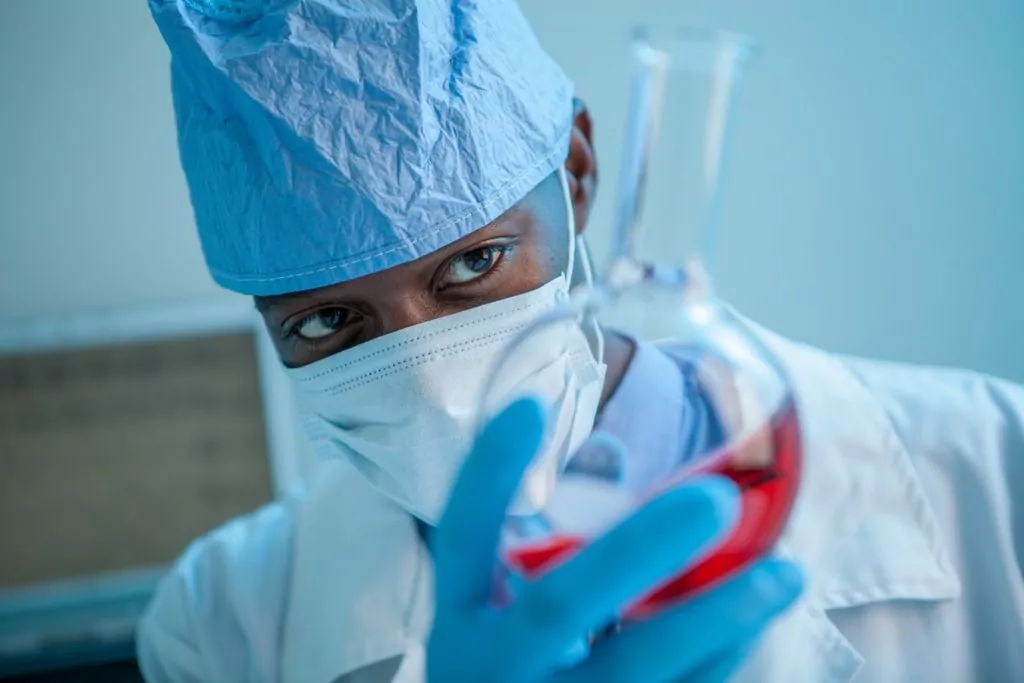by Ellen Blake
Covid19 Vaccine Safety: What’s true and what’s not?
With so much information about the Covid-19 vaccines online and in the news, it’s important to know what’s true and what’s not. Vince Venditto, PhD, assistant professor in the University of Kentucky College of Pharmacy’s Department of Pharmaceutical Science, works overtime to get the facts out about the safety and efficacy of the vaccines. With extensive expertise in vaccine design, he is highly qualified to educate others about the Covid19 vaccines. He has training in organic synthesis and vaccine development, and currently works on a clinical trial with community pharmacies to understand the prevalence of SARS-CoV-2 in Kentucky. Recently, Dr. Venditto tackled some of the more common statements he hears in his article in The University of Kentucky News:
Statement: The vaccine cannot be safe because development was rushed.
False. Though the approval of the vaccine for Covid-19 happened faster than any other vaccine, Pfizer and Moderna conducted research in this space for many years prior to the pandemic. The technology behind Pfizer and Moderna’s vaccines (mRNA vaccines), created as an efficient way to produce vaccines at unprecedented speed, proved effective for the SARS-CoV-2 vaccine. Their strong foundation in this technology made it possible to generate a Covid19 vaccine in less than a year.
Statement: Testing was not sufficient.
False. All drugs approved for human use undergo significant scrutiny to ensure efficacy and safety during clinical trials by the independent research organizations. And after that, the FDA vigorously tests them again before approving. The Covid-19 vaccine is no different. Even after FDA approval, the safety and efficacy of the drug or vaccine continue to be monitored for adverse effects. Researchers discontinued some of the COVID-19 vaccines tested in clinical trials because of serious illness in a few subjects, however, those illnesses were not associated with the vaccine.
Pausing a clinical trial is not uncommon. An independent safety monitoring board might halt a study to ensure safety of a vaccine. Since approval, there were a few reports in a small number of patients of a rare, but serious, allergic response reported; the safety monitoring boards continue to evaluate these events to ensure safety for those who receive the vaccine.
Statement: Having multiple vaccines that work, not just one, is advantageous
True. While one vaccine is an important achievement, it’s essential we have multiple vaccines approved based on different technologies. The number of doses necessary to immunize the entire world is not practical with just one, given different reagents are necessary to produce vaccines. This way, no single manufacturer carries the entire burden to ensure everyone across the world has access to a vaccine in a timely manner. In addition, not all vaccines work well in all populations. Historically, examples exist of vaccines that are more effective in specific ethnic populations for reasons not well understood. Because of this, multiple vaccines will ensure that everyone has access to a safe and effective vaccine.

Statement: We don’t really know what is in the vaccine.
False. The experts absolutely know what is in the vaccine. Though content varies from vaccine to vaccine based on the specific design from the company, the two first approved vaccines, from Pfizer and Moderna, include oil droplets with genetic materials to express non-infectious pieces of the virus.
Statement: We don’t know anything about the side effects.
False. All the clinical trials, with more than 30,000 subjects from around the world, monitor participants for side effects. Half the subjects in the clinical trial receive a placebo and half receive the vaccine. Subjects who receive the vaccine generally report soreness and swelling at the injection site, as well as fever, chills, tiredness and headache, which generally disappears after a few days. You want these side effects; they indicate your immune system is active and doing its job. Clinical trials continue to monitor participants for additional side effects after the studies; so far researchers observed none.
Statement: Eventually, Covid-19 will go away on its own.
False. This scenario is unlikely. SARS-CoV-2, like the common cold which is also a coronavirus, will continue to make kids sick every year. However, as we age, we generate an immunity due to exposure over the years that protects us from illness. The vaccine helps accelerate this process to protect us. However, as we are only a year into the pandemic, researchers and physicians will continue to monitor how many individuals become infected each year.
Statement: The mRNA vaccine will not affect your DNA/genetics.
True. The mRNA vaccine has no way to get into your DNA but still induces a strong immune response. This fantastic technology generates pieces of the virus to which our immune systems respond. Our cells use the mRNA, then destroyed it. It has no long-term effects on our cells.
Statement: The Covid-19 vaccines are placebos.
False. Clinical trials require a proper comparison between vaccine groups and placebo groups to show the vaccine is effective. Once the researchers make this comparison between the two groups, all vaccines administered will contain the active ingredients needed to induce an effective immune response to the virus.
Statement: A chip or marker that’s included in the vaccine tracks your whereabouts.
False. There’s not much to say about this one. It’s simply not true.
The bottom line
The Covid-19 vaccines available today are safe and effective. And a significant percentage of the population needs the vaccine to achieve herd immunity. In his article in The University of Kentucky News, Venditto says,
“I would personally get any of the approved vaccines, absolutely. I will also wait for my turn to ensure that those at highest risk can get vaccinated first since I am able to work remotely.”
*50PlusToday thanks to Dr. Venditto for sharing his expertise on this important issue.
The purpose of this article is informational only. For medical advice or questions about the Covid19 vaccine, or symptoms of the virus, please see your physician.










